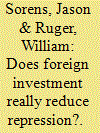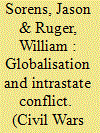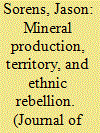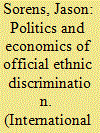|
|
|
Sort Order |
|
|
|
Items / Page
|
|
|
|
|
|
|
| Srl | Item |
| 1 |
ID:
117531


|
|
|
|
|
| Publication |
2012.
|
| Summary/Abstract |
Cross-national empirical studies have found that foreign investment has beneficial effects on human rights. We argue that these studies poorly operationalize foreign investment to test theoretical predictions and suffer from sampling bias. We demonstrate that investment stock, rather than inflow, is the superior operationalization of structural dependence theory. We construct regression models of government repression of physical integrity rights, include much more data than previous studies, and use a new multiple imputation algorithm for time-series cross-section data to resolve sampling bias. We find no evidence that foreign investment affects repression, contradicting conventional wisdom and suggesting that the political gains from repression frequently dwarf any economic costs for governments.
|
|
|
|
|
|
|
|
|
|
|
|
|
|
|
|
| 2 |
ID:
141471


|
|
|
|
|
| Summary/Abstract |
How does globalisation, especially foreign direct investment, influence the risk of intrastate conflict? While several prominent studies have found that globalisation reduces the probability of civil war, we use new data and methods to approach the question. In particular, we test for the possibility that foreign investment is endogenous to conflict risk and appropriately use inward foreign investment stock rather than net inflow to measure an economy's exposure to international capital markets. We find no evidence that foreign investment affects civil conflict, suggesting that governments' fundamental security interests trump the economic losses they can expect to suffer from failing to compromise with potential rebel groups.
|
|
|
|
|
|
|
|
|
|
|
|
|
|
|
|
| 3 |
ID:
107653


|
|
|
|
|
| Publication |
2011.
|
| Summary/Abstract |
Several possible relationships between natural resources and civil conflict have been hypothesized and tested in the literature. The impact of resources on conflict should depend on the circumstances of the group that (potential) rebels see themselves as representing and depend upon for support. While 'lootable' resources such as alluvial diamonds have been shown to increase the likelihood of insurgency, among territorially concentrated ethnic groups looting by rebels recruiting from the group is counterproductive because it imposes negative externalities on the rebel constituency. However, local mineral abundance could encourage rebellion indirectly, by promoting the development of secessionist objectives, since autonomy or independence would allow the rebel constituency to enjoy a larger share of the benefits flowing from mineral revenues. On the other hand, mineral abundance could encourage the government to exercise greater surveillance and control over potentially restive minority populations. On balance, then, mineral abundance should affect ethnoregional conflict primarily by encouraging ethnic rebels to adopt limited, territorial-autonomy objectives as opposed to governmental objectives. This hypothesis is tested with a new, global dataset of substate mineral production. Local mineral resource abundance is indeed negatively associated with governmental conflict among ethnoregional groups and positively related to secessionist or territorial conflict. Moreover, it is the total value of mineral production that matters, not specific types of minerals such as oil or diamonds. The net effect of mineral abundance on the total risk of intrastate conflict onset among ethnoregions is essentially zero.
|
|
|
|
|
|
|
|
|
|
|
|
|
|
|
|
| 4 |
ID:
096695


|
|
|
|
|
| Publication |
2010.
|
| Summary/Abstract |
It is argued that ethnic competition, triggers for ethnic mobilization, and political institutions together affect changes in government-imposed political and economic restrictions on ethnic groups worldwide. Due to the fact that the only existing comparative data set on ethnic discrimination, produced by the Minorities at Risk project, uses discrimination as a criterion for including ethnic groups, a new data set of 620 additional groups has been created to predict the selection process through a full-information, maximum-likelihood Heckman probit model, but selection bias is found not to affect the results. Discrimination is modeled as a dynamic Markov process, and central and regional government institutions, economic conditions, and minority group characteristics are found to influence the initiation and continuation of discriminatory policies.
|
|
|
|
|
|
|
|
|
|
|
|
|
|
|
|
|
|
|
|
|